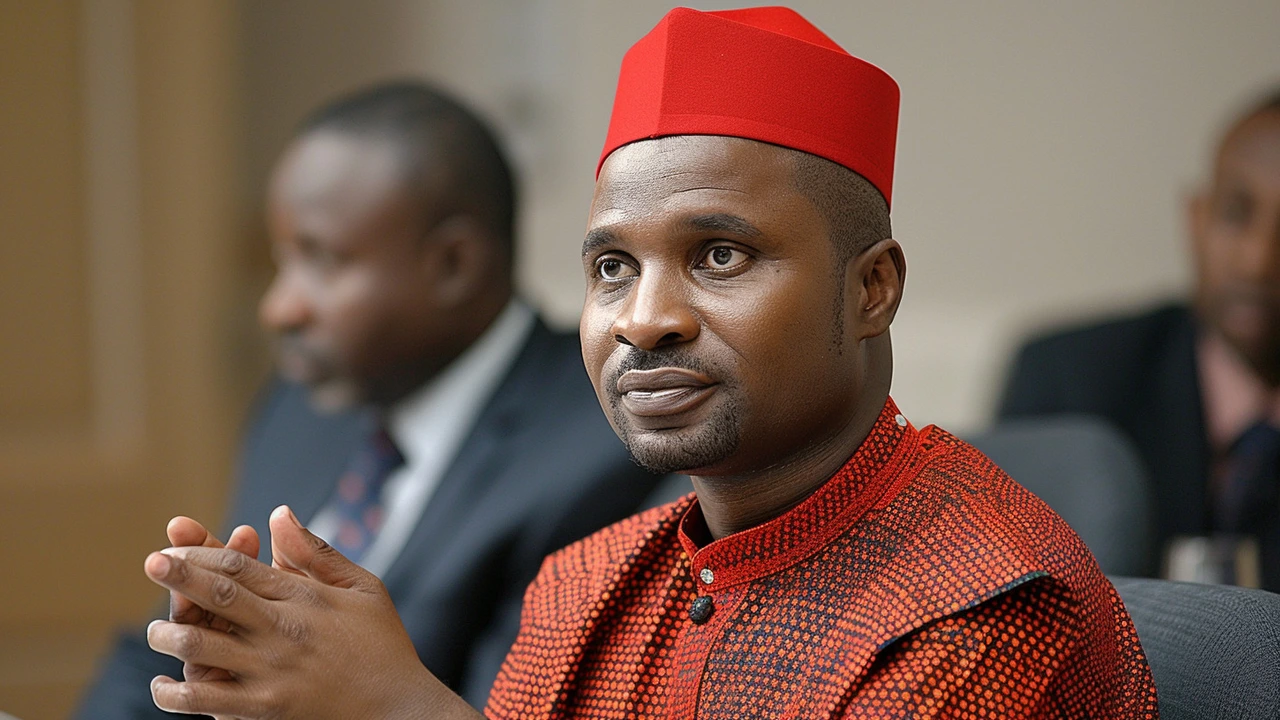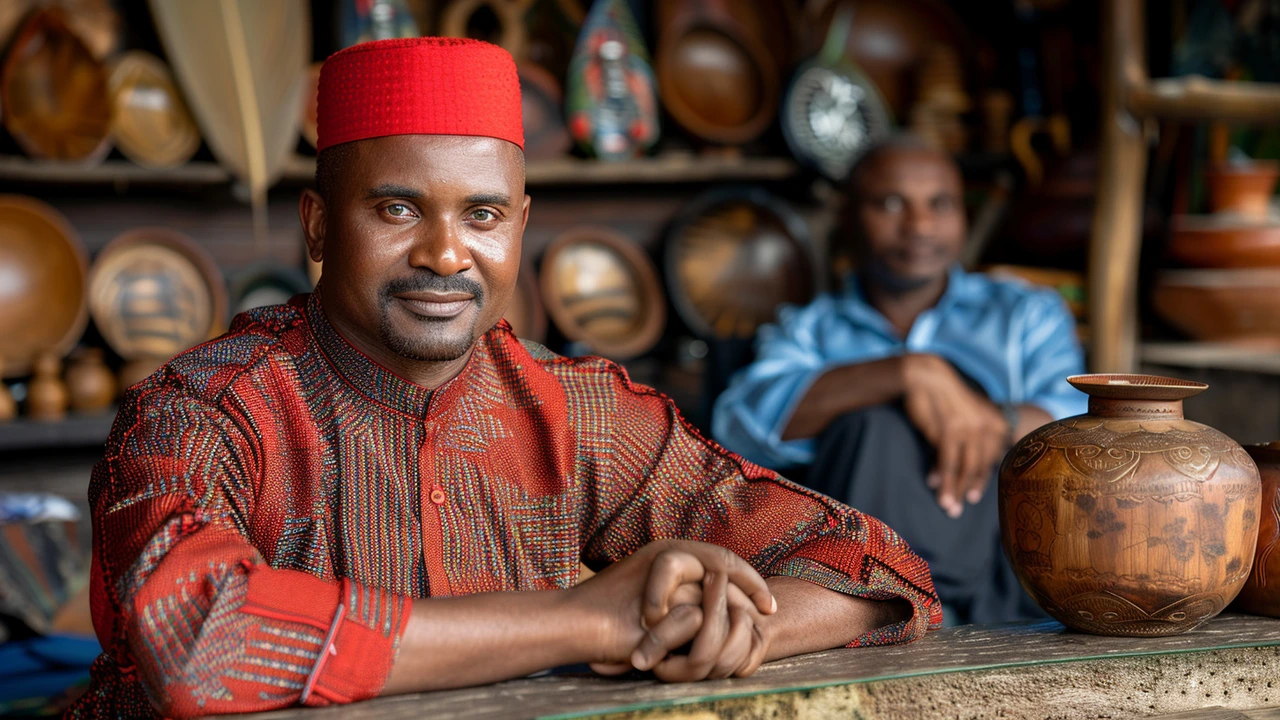Kenneth Okonkwo's Discontent with Labour Party's Commitment
Kenneth Okonkwo, a renowned Nollywood actor and a prominent figure within the Labour Party, has openly criticized the party, expressing serious dissatisfaction with its actions and hinting at a potentially imminent departure. This revelation comes as the party, which recently re-elected Barrister Julius Abure as its chairman, faces scrutiny over its commitment to the welfare of Nigerian citizens. Okonkwo has been vocal about his disapproval, pointing out the party's shortcomings in addressing the issues that matter most to the people.
Okonkwo's dissatisfaction is deeply rooted in his belief that the Labour Party has failed to show a tangible commitment to the welfare of the Nigerian populace. He emphasized that the well-being of Nigerians should be the foremost priority of any political party. In his words, 'any party that is not visibly committed to the welfare of Nigerians will most likely not see me there.' This statement highlights his determination to be aligned with a party that truly serves the people's interests.
The Root of the Discontent
Kenneth Okonkwo's discontent with the Labour Party became more apparent following the party's decision to re-elect Barrister Julius Abure as chairman. Okonkwo has been at odds with the party leadership since this re-election, a move that he suggests signals a lack of genuine commitment to change and progress. For Okonkwo, the leadership's actions do not align with the principles he holds dear, particularly regarding transparency, accountability, and a genuine commitment to improving the lives of Nigerians.
Okonkwo's association with the Labour Party was primarily driven by his desire to support Peter Obi's presidential campaign. Obi, known for his progressive stances and vision for Nigeria's future, resonated with Okonkwo's aspirations for the country. However, the actor-turned-politician seems to feel that the Labour Party under its current leadership is not upholding the values and goals he expected. This perceived disconnect has been a significant factor in Okonkwo's public expression of dissatisfaction.

The Journey to Labour Party
It's worth recalling that Kenneth Okonkwo joined the Labour Party after leaving the All Progressives Congress (APC) in 2022. His exit from the APC was primarily due to his disagreement with the party's decision to put forth a Muslim-Muslim ticket for the 2023 presidential election. This decision ran contrary to his beliefs and vision for a diverse and inclusive Nigeria. As an advocate for unity and representation across all sectors of Nigerian society, Okonkwo found it untenable to remain with the APC under such circumstances.
The Labour Party, with its focus on equitable representation and its alignment with Peter Obi's presidential campaign, seemed like a natural fit for Okonkwo at the time. His support for Obi's vision for Nigeria was evident, and he has been an active and vocal advocate for the party's objectives. However, the recent developments within the Labour Party have apparently caused him to reassess his position.
Possible Return to APC
Given his recent statements, Kenneth Okonkwo has not ruled out the possibility of returning to his former party, the All Progressives Congress (APC). While he left the APC due to significant ideological differences, particularly concerning the party's choice for the presidential ticket, the current state of affairs within the Labour Party has led him to contemplate this option. Okonkwo's potential return to the APC would undoubtedly raise questions and generate discussions within political circles, especially given his reasons for leaving the party initially. Whether the APC will address the issues that caused his departure remains to be seen, but his consideration of this move indicates the depth of his dissatisfaction with the Labour Party.

The Importance of Welfare in Politics
One of the key takeaways from Kenneth Okonkwo's statements is his emphasis on the importance of prioritizing the welfare of the people. For him, any political party worth its salt must place the well-being of the populace at the forefront of its agenda. This belief underpins much of his political journey and activism. By holding his party accountable to these standards, Okonkwo is striving to ensure that the leadership remains true to its promises and works earnestly towards the betterment of society.
Okonkwo's critique of the Labour Party serves as a reminder that political parties must not lose sight of their commitments to the people. It underscores the necessity for transparency, accountability, and a clear focus on policies that directly benefit the general population. In a country like Nigeria, where socio-economic challenges are significant, the expectation for political parties to deliver meaningful change is especially high.
What Lies Ahead for Kenneth Okonkwo?
As Kenneth Okonkwo contemplates his future within the Labour Party, or potentially beyond it, it is clear that his primary concern remains the welfare of Nigerians. His political journey thus far has been marked by a commitment to this cause, and it is unlikely that he will veer away from it. Whether he chooses to stay with the Labour Party and push for changes from within, or opts to rejoin the APC and their proposed policies, Okonkwo's actions will be closely watched.
His next steps could have considerable implications not only for his political career but also for the broader political landscape in Nigeria. If he does decide to depart from the Labour Party, it could spark further conversations about the party's direction and leadership. Conversely, his advocacy for the welfare of Nigerians may serve as a catalyst for internal reforms within the party. Either way, Kenneth Okonkwo's dedication to the well-being of Nigerian citizens will undoubtedly continue to shape his political endeavors.

The Broader Picture
Kenneth Okonkwo's situation is a microcosm of a larger issue within Nigerian politics—the challenge of ensuring that political parties remain committed to the welfare and betterment of the citizens they represent. Political leaders and parties must constantly evaluate their actions and policies to ensure they are meeting the needs of the populace. Okonkwo's critique of the Labour Party, while personal, echoes a broader sentiment that political accountability and commitment to public welfare must be steadfast.
In conclusion, Kenneth Okonkwo's public criticism of the Labour Party and his contemplation of leaving the party signal ongoing tensions within the Nigerian political landscape. His commitment to the welfare of Nigerians is a stark reminder of the expectations that citizens have from their leaders. As the political dynamics continue to evolve, it remains to be seen how Okonkwo's journey unfolds and what impact it will have on the parties involved and the broader quest for improvement in Nigeria.


Jeremy Ramsey
June 22, 2024 AT 03:30Man, I get it. Nollywood stars stepping into politics always brings drama, but Okonkwo’s got a point. If your party’s more about power plays than people, why stay? 🤷♂️
Henry Huynh
June 22, 2024 AT 11:20Labour Party just turned into a meme
Don McBrien
June 23, 2024 AT 14:53This is why we need more voices like Okonkwo in politics. He’s not just yelling-he’s holding space for real change. We need leaders who care more about bread than badges.
Ed Thompson
June 24, 2024 AT 03:29Bro’s out here doing the real work-no cap. Party’s stuck in 2019 energy while the people are screaming for infrastructure, healthcare, and actual policy. Obi’s vision got hijacked by bureaucratic noise. Time to pivot or exit. No room for lukewarm allies.
Sara Reese
June 25, 2024 AT 02:03Interesting how he’s suddenly concerned with welfare... after jumping from APC to Labour to maybe back to APC? 🤔 People don’t change parties-they change convenience.
Richie Cristim
June 25, 2024 AT 17:14why did he leave apc again was it the muslim muslim ticket or just because he thought obi would win
Lindy Loo
June 26, 2024 AT 23:11I love that he’s not afraid to say ‘this isn’t working’-even if it’s unpopular. Real leaders don’t stay just to keep a seat. They stay to make things better. And if they can’t? They walk. Period. 💪
Lisa J
June 28, 2024 AT 16:59I’m so proud of him for speaking up. So many people stay quiet just to keep their platform. He’s choosing integrity over visibility. That’s rare. 🌟
Bronwen Davies
June 28, 2024 AT 17:07He’s got that Nigerian ‘I’m not here to play games’ energy. The kind that makes you sit up straight when they speak. Labour’s been coasting on Obi’s glow, and now the sun’s setting. Time to either light a new fire or let the embers die.
Aquilino Mcquiston
June 28, 2024 AT 20:33you know the real question is not where he goes but whether any party in nigeria can actually be trusted to put people first. we’ve seen this movie before. the hero leaves the villain only to find the villain is just wearing a different mask
Cindy Crawford
June 30, 2024 AT 00:26Actually, he left APC because the ticket didn’t match his personal identity politics, not because of any principled stance on representation. He’s inconsistent. Also, Obi’s campaign was funded by diaspora money, not grassroots energy.
Markos Charatzas
June 30, 2024 AT 05:21Pathetic. A celebrity thinks he knows governance because he acted in a movie. The Labour Party has real policy. He’s just mad because he’s not the star anymore. No one cares what he thinks.
Lena Michaels
June 30, 2024 AT 23:23Honestly? I’m lowkey glad he’s speaking up. Even if he’s a bit dramatic, someone’s gotta call out the performative activism. But also… if he’s thinking about going back to APC… yikes. That ship sailed when they did the Muslim-Muslim thing. Still, I respect the courage to say ‘this isn’t it’.